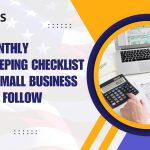Your Year-End Accounting Checklist for 2025: Prepare Now, Save Later
As 2025 comes to a close, small business owners need more than just a quick glance at their books. Year-end accounting is about tying up loose ends, preparing for tax season, and setting the foundation for the year ahead. By following a structured year-end checklist, you’ll not only stay compliant but also uncover opportunities to save money, reduce stress, and position your business for growth in 2026.
Why Year-End Accounting Matters
Closing out your financial year properly ensures accuracy and compliance, but it also helps you make smarter business decisions. A year-end checklist gives you the chance to:
- Confirm that your books are accurate and tax-ready
- Catch missed expenses or revenue entries
- Maximize deductions and tax-saving strategies
- Strengthen cash flow and budgeting for the next year
- Avoid costly surprises during tax season
The Year-End Accounting Checklist
Reconcile All Accounts
Ensure your bank accounts, credit cards, and loan balances match your bookkeeping records. Reconciliation highlights errors, fraud, or missing transactions.
Review Accounts Receivable
Check for unpaid invoices. Send reminders, write off uncollectible debts, or set up payment plans. Clean receivables help improve year-end cash flow and reduce tax liabilities.
Verify Accounts Payable
Confirm that all vendor bills are recorded and scheduled for payment. Paying bills on time avoids penalties and may even allow you to take advantage of early payment discounts.
Update Payroll Records
Review payroll reports, bonuses, and benefits. Ensure W-2s and 1099s are accurate before filing deadlines. Don’t forget to review state payroll tax requirements.
Review Fixed Assets & Depreciation
Update your fixed asset register and record depreciation. If you purchased equipment, vehicles, or property in 2025, ensure it’s reflected correctly in your books.
Organize Tax Documents
Gather receipts, mileage logs, expense reports, and charitable contributions. Well-organized tax documents mean fewer headaches when filing with the IRS and state agencies.
Analyze Financial Statements
Review your profit and loss statement, balance sheet, and cash flow report. These statements provide insights into profitability, debt levels, and growth opportunities.
Plan for Taxes & Deductions
Work with your accountant to identify deductions, credits, and strategies. This could include retirement contributions, equipment purchases, or charitable giving.
Back Up & Secure Your Records
Protect your financial data with secure cloud backups or encrypted external storage. Data security is critical for both compliance and peace of mind.
Common Year-End Mistakes to Avoid
- Waiting until January to start organizing records
- Forgetting to record last-minute expenses
- Ignoring overdue invoices
- Skipping payroll adjustments and compliance checks
- Failing to back up financial data securely
Why Bay Area Accounting Solutions Is the Best Choice
At Bay Area Accounting Solutions, we make year-end accounting simple and stress-free for small businesses. Here’s why we’re trusted across California:
- California Expertise — We know CDTFA rules, federal tax laws, and local compliance inside and out
- Comprehensive Services — From bookkeeping to payroll, tax filing, and audit support, we cover it all
- Catch-Up Specialists — If you’ve fallen behind, our team will organize your books quickly and accurately
- Technology-Driven — Cloud-based tools for real-time tracking and secure backups
- Personalized Consultations — Strategies tailored to your industry and year-end goals
We’ve helped hundreds of small businesses avoid tax penalties, maximize deductions, and start the new year financially strong.
Pro Tip for Small Business Owners
Don’t wait until the last week of December to start your year-end checklist. Begin early so you can review, adjust, and take advantage of last-minute tax-saving opportunities.
Conclusion
Year-end accounting isn’t just about closing the books—it’s about preparing your business for success in 2026 and beyond. With a structured checklist, you’ll stay compliant, save money, and gain valuable insights for growth. If you want to simplify the process and focus on running your business, Bay Area Accounting Solutions is here to guide you every step of the way.
FAQ — Year-End Accounting for Small Businesses
Q1: When should I start my year-end accounting process?
A: Ideally in November or early December, so you have time to correct errors and take advantage of tax-saving strategies.
Q2: What financial statements should I review at year-end?
A: The profit and loss statement, balance sheet, and cash flow report are essential for understanding your financial health.
Q3: Do I need to issue 1099s at year-end?
A: Yes, if you’ve paid $600 or more to independent contractors or freelancers, you must issue Form 1099-NEC.
Q4: What’s the benefit of reconciling accounts before year-end?
A: It ensures your records match bank balances, reduces errors, and makes tax filing smoother.
Q5: Can Bay Area Accounting Solutions help with tax planning?
A: Absolutely. We specialize in year-round tax planning to minimize liabilities and maximize savings for small businesses.



